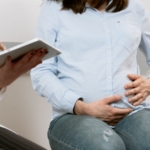While many women complain of psychological distress during infertility treatment, it has been somewhat unclear if the anxiety and depression women may experience is related to having to undergo infertility treatment or to the hormonal agents that are used as part of the treatment, or a combination of the two. Recent studies have attempted to identify risk factors for mood and anxiety emerging within the context of infertility treatment.
In a small study, Italian researchers explored the influence of both assisted reproductive technology (ART) and reduced quality of life (QoL) during pregnancy on risk for postpartum depression. 63 sub-fertile patients who conceived through ART and 72 women who conceived naturally were enrolled in this prospective study. At 22 and 32 weeks of gestation, the women completed the Edinburgh Postnatal Depression Scale (EPDS) and the Short-Form 36 (SF-36), in order to assess depressive symptoms and QoL, respectively. The EPDS was again administered at 15 days after birth.
At both time points, higher EPDS scores and lower mental well-being scores on the SF-36 predicted higher levels of depressive symptoms during the postpartum period. While the mode of conception had no significant effect, the number of previous ART cycles emerged as the strongest predictor of PPD. While this study is small and should be repeated in larger populations, it points to the fact that certain groups of women may be more vulnerable to mood and anxiety disorders in the context of infertility treatment.
To better understand the impact of infertility treatment on mood, we are now conducting an observational study that tracks women’s mood symptoms over the course of infertility treatment. Those eligible for the study include all women with a history of major depression or bipolar depression currently in remission who are planning or are undergoing infertility treatment. Study participation includes monthly visits to the Center for Women’s Mental Health and infertility treatment diaries to be completed at home. Read more about the study here.
Ruta Nonacs, MD PhD
Monti F, Agostini F, Paterlini M, Andrei F, De Pascalis L, Palomba S, La Sala GB. Effects of assisted reproductive technology and of women’s quality of life on depressive symptoms in the early postpartum period: a prospective case-control study. Gynecol Endocrinol. 2015 Jan 27:1-5.








Leave A Comment